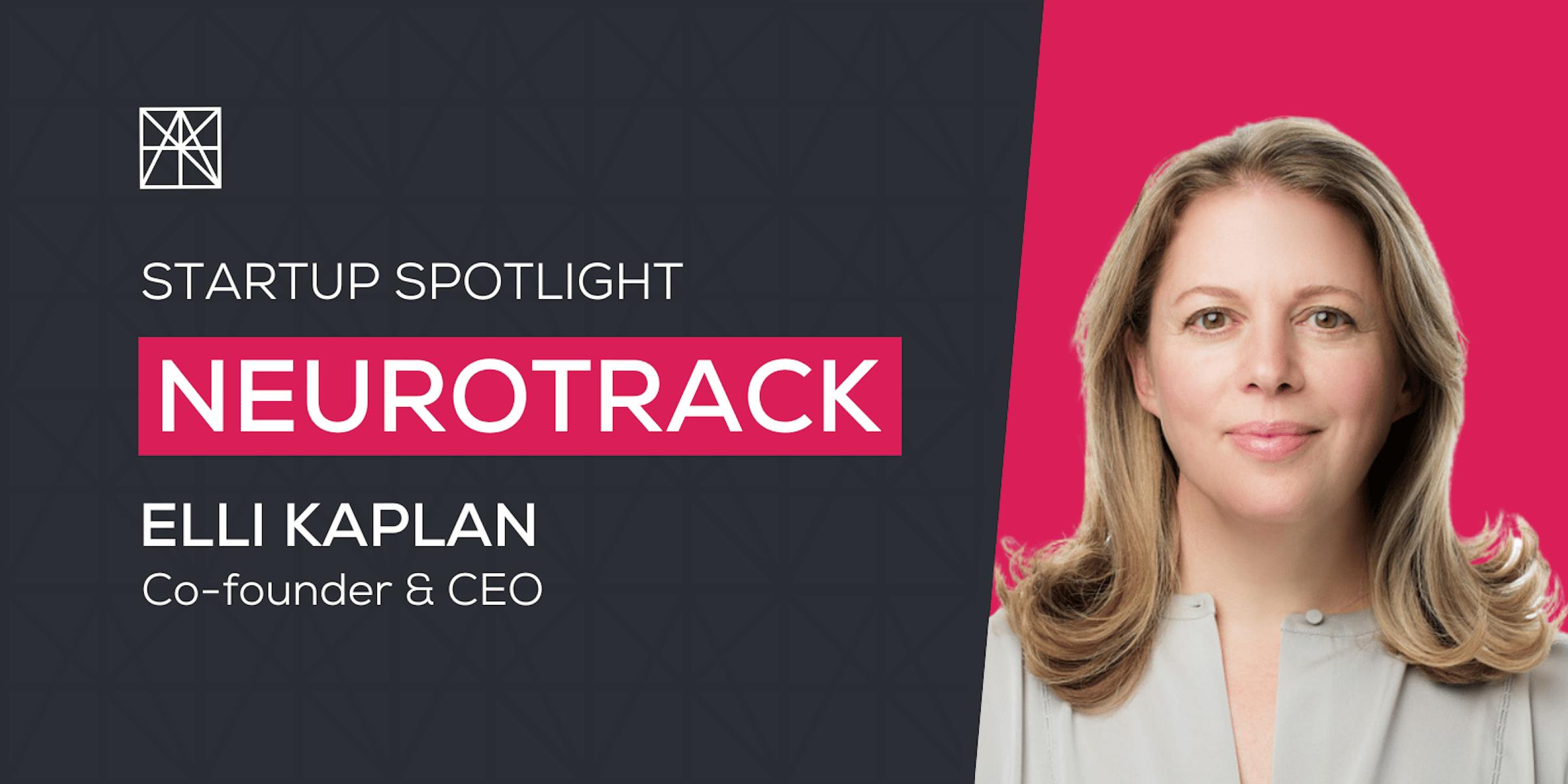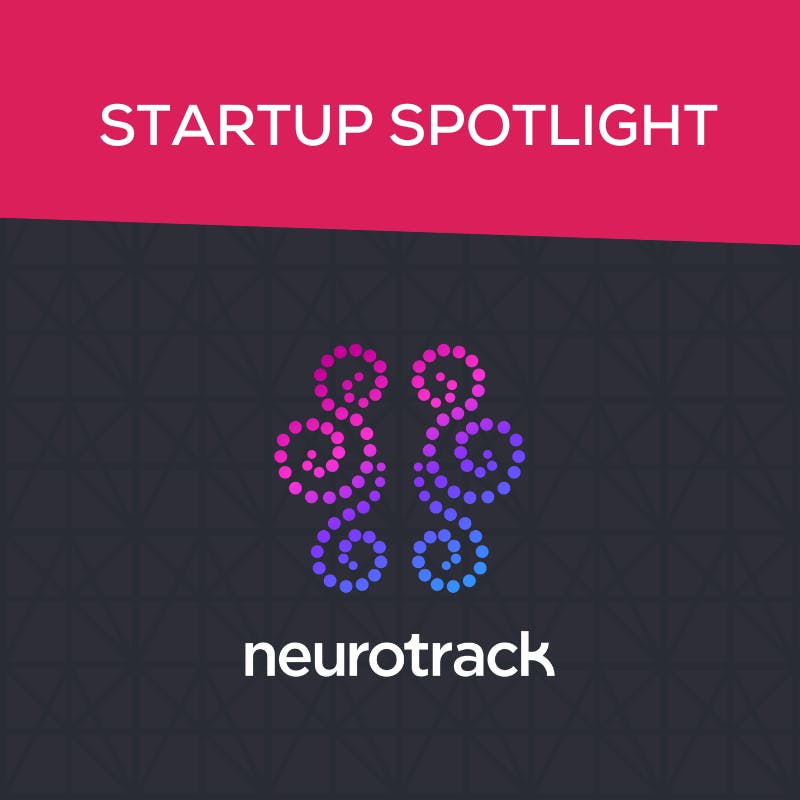MATTER startup spotlight: Neurotrack
Helping primary care teams catch cognitive impairment early
Early detection and diagnosis of Alzheimer’s disease is critical in allowing for the best opportunity for care management and treatment; however, less than half of primary care physicians report assessing patients age 60 and older for cognitive impairment.
In late 2022, MATTER partnered with the Alzheimer’s Association to launch a pitch competition to identify solutions to increase cognitive assessment and early detection and diagnosis of dementia within primary care settings. On February 2, 2023, Neurotrack won the competition for its clinically validated digital cognitive tests that measure and monitor cognition, paired with its cognitive health program that enables individuals to make lifestyle changes to strengthen their cognitive health as they age.
We sat down with Neurotrack Co-founder and CEO Elli Kaplan to learn more about Neurotrack’s story and solution, her diverse career experiences and lessons she’s learned along the way.
Responses have been edited for length and clarity.
MATTER: Tell me about Neurotrack’s solution and the problem you’re solving for.
Elli: Neurotrack is a digital health company working to change the way that Alzheimer’s disease is diagnosed and ultimately treated. Currently, we have the largest aging population in the history of time, and it’s growing rapidly. Alzheimer’s disease is one of the greatest unmet healthcare challenges, starting with the fact that we haven’t historically had a good diagnostic or assessment tool.
Neurotrack’s digital cognitive and behavioral health platform scales access to better, more accurate, easier-to-use digital tools to help both patients and providers better understand one’s risk for cognitive decline in Alzheimer’s.
We provide rapid, culturally agnostic cognitive testing to providers in addition to carefully vetted educational content and personalized coaching to individuals to support their cognitive well-being between office visits.
MATTER: What’s Neurotrack’s story?
Elli: The idea for Neurotrack came from a very personal place. I had two grandparents with Alzheimer’s disease. When we first started noticing signs in my grandfather, we tried to get some sort of diagnosis but quickly realized that receiving a definitive diagnosis for Alzheimer’s was actually extremely challenging — and once my grandfather was officially diagnosed, there were no treatment solutions. We then started noticing symptoms in my grandmother on the other side of my family a number of years later and saw that nothing had changed.
I come from a healthcare family, so I thought: “If this is so challenging for people who understand how healthcare works and have access to good resources, what is the situation like for the millions of others who may not?” As I started exploring the current state of cognitive testing, I realized there was so little testing performed and the tools that existed were very coarse in terms of their ability to give people deep insight into their cognition.
That’s when I discovered the work of my co-founders, Dr. Stuart Zola and Dr. Beth Buffalo. They were in the final stages of a six-year longitudinal study, looking at a technology they developed that uses eye tracking to assess impairment in the hippocampus, the part of the brain that stores memory and is first impacted with a disease like Alzheimer’s. The data was overwhelming: it showed that they could identify people much earlier than had ever been possible before. From there, we formed Neurotrack and licensed the technology.
Fast forward to today, their tool is part of our battery and is our foundational IP. We’ve also gone on to develop other cognitive assessment tools, care management tools and a digital therapeutic — our cognitive behavioral health program — to empower and enable providers to better assess their patients and manage the disease.
MATTER: What milestones have you reached?
Elli: From the start, we’ve had the perspective that to be successful and scale commercially, all of our products must be clinically and scientifically validated — which we’ve invested tremendous resources into doing. We now have 25 peer-reviewed publications, are FDA class II registered and have 11 patents.
One of our most recent milestones is the development of our three-minute cognitive test, which is an extremely powerful screening test that fits very neatly into existing clinical workflows and gives providers a much more accurate tool for identifying patients with either mild cognitive impairment or Alzheimer’s disease.
Now, we’re focused on commercial milestones, selling our tools to both provider networks and health systems for primary care doctors to use in their clinics. We’ve secured partnerships with both long-term care organizations and large health systems that we’re continuing to scale in order to reach as many older adults as we possibly can.
MATTER: What is your background, and how did it prepare you for this venture?
Elli: I started my career in politics and government, working on largely international economic issues in the Clinton administration at the White House, State Department and Treasury Department. That experience gave me a solid understanding of the role and power that government can play as a force for good, particularly as it relates to startups.
For example, healthcare founders sometimes think they don’t need to get FDA approval or conduct clinical trials, which can show a lack of awareness of how powerful they can be in giving startups credibility in the market. My time in politics taught me to see government as a lever to propel a business rather than a hurdle.
Then, I moved to New York and went into private equity at AIG where I invested in emerging markets and learned a lot about how to raise capital and properly resource a company. Also, because I was investing in developing countries, I saw the role that new business could play in making broad, sweeping changes to an industry, which translates to how Neurotrack’s new tools and products are changing the landscape and improving the way providers operate and think about a new line of service for their patients.
Following my time in finance, I worked at the United Nations for about three years, again working on big, international economic development projects. I spent a lot of time investing in local entrepreneurs and thinking about how we could use private partnerships to help buoy the economy and invest in people, and specifically in women.
Then I went back to school at Harvard to get my MBA, which is where I was bitten by the entrepreneurial bug. It was at this time that my grandfather started to show signs of Alzheimer’s disease. Right after business school, I helped start one of the largest startup accelerator programs in the Southeast at Georgia Tech. I learned more about how to start a company, how to prove product-market fit and everything else you need to do to have a successful business.
I combined this experience with what I witnessed as a young child from my father providing pediatric care on Native American reservations — that healthcare can play a pivotal role in changing people’s lives — to start Neurotrack. I wanted to help change the way that Alzheimer’s disease is handled in the U.S.
I feel like my whole career has led up to this moment, from my time in government and thinking about how it can play a role in helping propel and fuel business in the right way to my experience in finance and with startup accelerators.
MATTER: What have you learned throughout your career that you’d like to share with other entrepreneurs in healthcare?
Elli: First, never compromise your values. As you’re starting a company and determining its mission and core values, you will constantly face forks in the road. It’s important to be very explicit at the outset of what’s important to you, and holding true to that is key. It’s not always the easiest thing to do, but there’s a difference in the long-term trajectory of companies that adhere to certain values versus those that don’t.
Second, it’s all about your team and your customers — there are no two more important stakeholders. Developing in healthcare is a marathon, not a sprint, so you have to set the company up in a way that ensures your people have some amount of work-life balance and are able to be their whole self at work.
Authenticity plays a vital role, particularly in the way you lead and the example you set for others. For example, if I have to take my child to a doctor’s appointment in the middle of the day, I’m honest and tell people that so they understand that it’s okay to have responsibilities outside of work. Being flexible and authentic is the only way to build a culture where people want to be and will stay.
For your customer, it’s incredibly important that you never compromise when it comes to building the best product and ensuring that the customer experience is paramount to everything else. Without a great product, how are you going to improve people’s lives?
MATTER: What value did you gain from the Alzheimer’s Association Pitch Competition?
Elli: First and foremost, we connected with a medical director of a large multi-specialty practice in Texas who was a judge for the competition, and we are now in active partnership discussions with that organization — we’re also engaging with their research division on a few other potential projects. The pitch competition provided incredible value to us as we’re continuing to scale and develop partnerships in our markets.
About MATTER
At MATTER, we believe collaboration is the best way to improve healthcare. The MATTER collaborative includes more than 800 current and alumni startups from around the world, working together with dozens of hospitals and health systems, universities and industry-leading companies to build the future of healthcare. Together we are accelerating innovation, advancing care and improving lives. For more information, visit matter.health and follow @MATTERhealth.
About Neurotrack
Neurotrack is a digital health company on a mission to transform the diagnosis and management of dementia and Alzheimer’s disease. The company develops clinically-validated cognitive assessments, including the first ever three-minute digital screening to detect cognitive impairment in annual wellness visits. The company also provides patient education and behavioral health support to address modifiable risk factors. Neurotrack has published 25 peer-reviewed papers, holds 11 patents on its proprietary technology, and is registered as an FDA class II medical device. Working with providers and payers, Neurotrack has enabled more than 200,000 cognitive assessments on its platform. For more information visit neurotrack.com.




